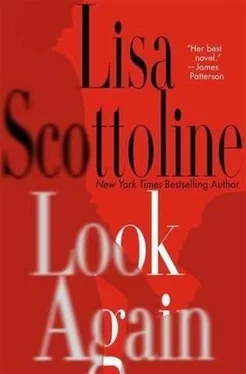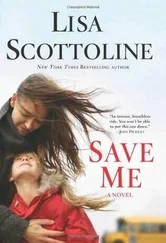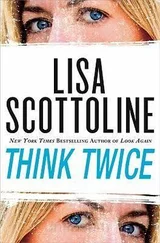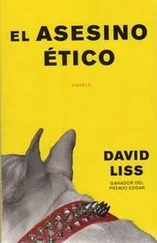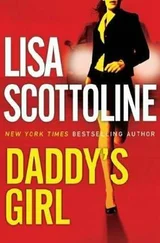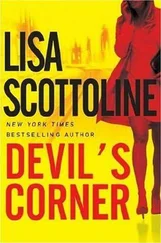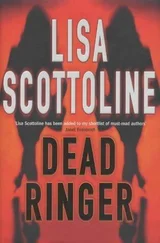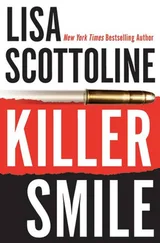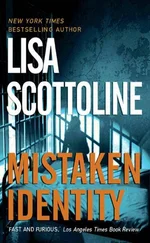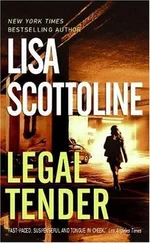Thank you, Amy, for the gift of your child.
Oreo Figaro looked over, blinking, and she set down the wine, returned to the box, and kept digging, finally reaching more court papers, with her caption at the top. Consent of Birth Parent, read the heading, and the form showed Amy's name and the Stoatesville address, and her birth date, which was July 7, 1983, and marital status, which read single. The paper was signed by Amy Martin under the sentence, I hereby voluntarily and unconditionally consent to the adoption of the above-named child. The paper had also been witnessed by Gerry Martin and Cheryl Martin, from the same address.
Ellen skipped to the next form, which was the consent of the birth father, and she learned his name and address with her heart in her throat:
Charles Cartmell 71 Grant Ave Philadelphia, Pennsylvania
She eyed his signature, a messy scrawl with barely comprehensible loops. So Charles Cartmell had been Will's father, and she couldn't help but wonder what he had been like. What he looked like. What he did for a living. How did he and Amy meet, and why did they never marry?
She returned to digging in the box but found nothing else relating to Will except his medical information sheet, which she already had in her file, stating that both birth parents had a history of high blood pressure. There was no mention of any heart problems, which was consistent with what she'd been told by the hospital, that Will's heart defect could have originated with him. The state had a voluntary medical registry online, but Will's birth parents had never registered. Still, the consent papers were a tangible answer to a question Ellen hadn't been able to articulate, even to herself.
"Well, that settles that," Ellen said aloud, startling Oreo Figaro. Her gaze fell on the papers on the table, and her thoughts strayed to poor Karen. She remembered that Karen had called to congratulate her on the day Will's adoption papers were processed. It was so hard to believe that she would be dead a little over a month later, by her own hand. Ellen shuddered and took a last sip of wine. It was so awful to think of Karen doing that, with three little kids at home. Musko had been right about that much.
Where was a mother's instinct then?
She couldn't think about it now. It was late and she had to get to bed. She'd done enough for one day, except on her homicide story. She'd normally have drafted something after her interview with Laticia Williams, but tonight she was too beat. She set the wineglass down next to the box, but a bright pink splotch amid the clutter caught her eye. She moved the papers aside. It was the hot pink of Karen's leather Filofax.
She picked it out and opened it, idly. It was a standard date book, a week on two opposing pages, and each page bore Karen's neat script, noting her appointments and meetings by client name. Ellen felt a pang, looking at the record of a woman's life, her time on earth divided into billable increments. What the diary couldn't show was that, in those increments, this woman had changed lives.
She flipped back in time through the Filofax, slowing when she reached the week of July 13, the day on which Karen had committed suicide. That week began on Monday, July 10, and the Filofax showed a neat lineup of appointments. The eleventh showed Karen had a client meeting in the morning and a Women's Way luncheon.
Ellen scanned the rest of the week, including the day Karen died. The lawyer had had appointments scheduled all day long, which made sense. Karen couldn't have known that the night before, her husband would find out about her affair. Ellen was about to close the book when she noticed that one of the appointments, on Wednesday, didn't have a name, but only an initial: A, written next to the time: 7:15 P.M.
Ellen was intrigued. A nighttime meeting? Maybe A was Karen's lover? She skipped back to the week before that, but there was no A, and then the week before that. There, in the middle of the week, on Wednesday, June 28.
A, also at 7:15.
She flipped pages to the week before, and then the week before that, which brought her to Wednesday, June 14.
A, this time at 9:30 P.M.
She mulled it over. That was the day before Will's adoption was final, on June 15. She flipped back to earlier weeks, checking each one, but there were no other meetings with A. She sat back, thinking, and her gaze shifted to the letter on the table, from Amy Martin. The date on the letter was June 15.
Ellen thought a minute. There had been a meeting with A, and then the next day, a letter from Amy Martin. She put two and two together. "A" wasn't Karen's boyfriend. "A" could stand for Amy.
She sank into a chair at the table, her good mood evaporating. She looked again at the letter. It even said "in our meeting." So Karen had had a meeting with Amy. But Ellen didn't remember seeing Amy's name in the Filofax, anywhere. She paged through it again, around June, and double-checked. There was no notation of a meeting with Amy Martin or Charles Cartmell, though all the other client meetings had been noted.
Ellen set down the Filofax and reached for her wine. She took a sip, but it tasted warm and bitter. She knew what she had to do, first thing tomorrow morning. Finish this thing once and for all. Put an end to her dwelling. She was driving herself nuts.
"Why can't I leave well enough alone?" she asked, aloud.
But Oreo Figaro merely blinked in response.
The next morning as Ellen put on her coat, she was already wondering how soon she could call Amy Martin. Will's fever had broken, and he was running around the living room with a new Penn State football that Connie had just brought for him. Ellen withheld the lecture on not introducing new toys before school. Working mothers had no time for spontaneity unless it was scheduled.
"He knows just what to do!" Connie said, delighted. "My Mark was like that, too."
"Look at me!" Will circled the coffee table with the blue football tucked under his arm. "Look, Mommy!"
"Watch where you're going, buddy," Ellen called back, and Oreo Figaro jumped out of the way as Will hurtled past him, turned left into the dining room, and ran into the kitchen. He ran through the kitchen, up and over the stairway, and ended up back in the living room, a circular floor plan designed for little boys and NASCAR drivers.
Connie said, "You know, he looks like a natural athlete."
"You think?" Ellen picked up her purse and briefcase, listening to the pounding of Will's feet through the kitchen. Whoever coined the expression pitter-patter-of-little-feet had a kitten, not a child.
"I should get Mark over here to throw the ball with him sometime."
Will came running back into the living room and looked up grinning, his cheeks flushed. "I did it! I made a yesdown!"
"You mean a touchdown?" Connie corrected him, and Ellen laughed and held out her arms.
"Gimme a hug. I gotta go to work and you gotta go to school."
"Mommy!" Will ran to her, and Ellen hugged and kissed him, brushing his bangs from his eyes.
"Love you. Have fun at school."
"Can I bring my football?" Will's eyes widened with hope.
"No," Ellen answered.
"Yes," Connie said, at the same minute.
"I WANT TO!" Will hollered, jiggered up.
"Hey, quiet down, pal." Ellen held his arm, trying to settle him. "No shouting in the house."
"I want to bring my ball, Mommy!"
"Fine, okay." Ellen didn't want to leave on a bad note, another axiom of Working Mother Guilt.
"Goody!" Will rewarded her with another hug, dropping the football and throwing his arms around her neck.
Ellen felt a twinge of separation anxiety, worse than usual.
Maybe because she knew what she was about to do, after she left.
Читать дальше
